Even Tommy Robinson praises Trevor Phillips and his anti-Muslim bigotry
According to Phillips, Muslims “see the world differently from the rest of us” – why has he not yet been expelled from the Labour Party?
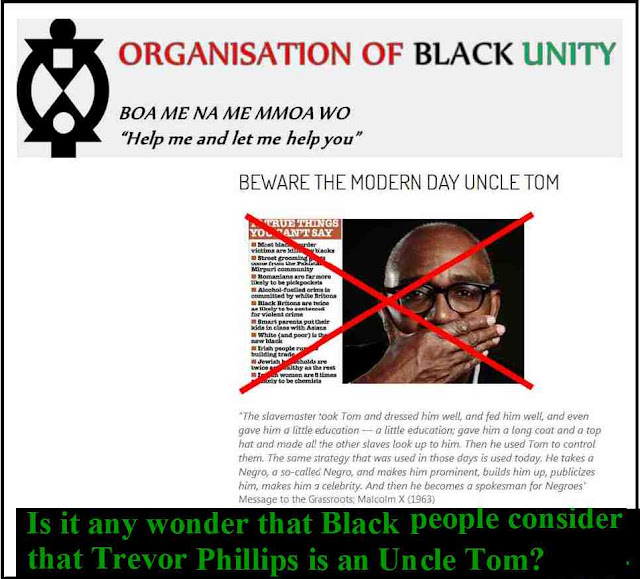
Imagine that someone had said that the genocidal actions of Israel can be traced to the fact that it is a Jewish as opposed to a Christian state and it is because of the ‘ideology’ of the Jewish religion? Who can doubt that this would be anti-Semitic? Yet this is what Trevor Phillips has been getting away with for years in regard to Muslims.
I think there’s little doubt that it’s the extremist adherence of one particular faith – Islam – who have created a major fault line in this country”.
When I was a student activist I knew Trevor Phillips. Not personally but politically! Apart from being a delegate to NUS Conferences between 1975 and 1981 I was also a member of NUS’s Polytechnic’s Committee for 2 years (all the Polytechnics converted to universities from 1992 onwards) so I frequently came into contact with him.
I had a number of battles with Phillips since the Polytechnics were considered to be a bastion of the far-left unlike the right-wing universities. I was also at the time Vice-President of Brighton Polytechnic.
My impression of Phillips was that he had no fixed principles other than self-advancement. It was clear that he was using the fact of being Black for career purposes even though he never had anything positive to say about fighting racism.
Phillips was a member of the ruling Broad Left/Left Alliance which included such ‘socialists’ such as David Aaronovitch of the Communist Party, (yes it is true!), Charles Clarke, the Bunterish President who at the time was strong on the civil liberties such as supporting the defendants in the ABC trial concerning breaches of the Official Secrets Act. When Clarke became Home Secretary under Blair he was one of the most illiberal people to occupy that office. And of course Jack Straw, the first ‘left’ President of NUS who as Foreign Secretary presided over the extraordinary rendition of people who were kidnapped for a spot of torture in places such as Libya and Morocco.
Phillips impressed me most because of his complete indifference to the fight against racism and fascism. Most younger people don’t realise the battles we had against the resurgence of fascist parties in the 1970s and 1980s.
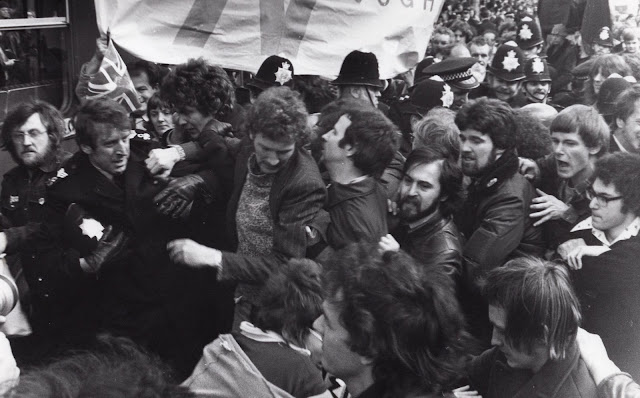
Anti-fascists opposing the National Front demonstration in The Battle of Wood Green in April 1977 – Phillips and people like Sue Slipman opposed physical confrontations with the fascists
One issue dominated NUS during the 1970’s. It was a time when the National Front was kicking its way into the headlines. They achieved 16% in the West Bromwich by-election in 1973 with Martin Webster, their neo-Nazi leader, as candidate. In 1977 in the Birmingham Stechford by-election Andrew Brons, another neo-Nazi (later to become a BNP MEP) beat the Liberals into 4th place.
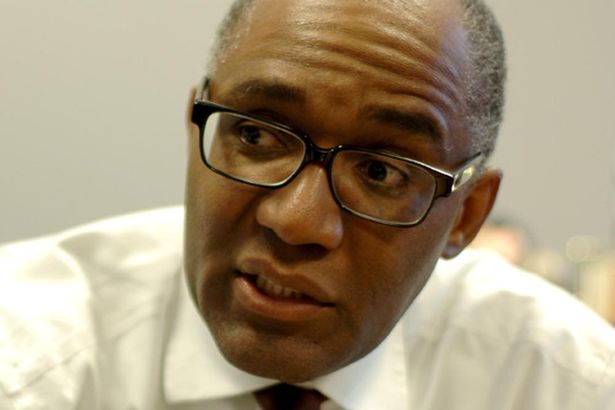
For the first time since the war a neo-Nazi holocaust denying party was talked of as a legitimate political party. It was a time of mass anti-fascist activity.
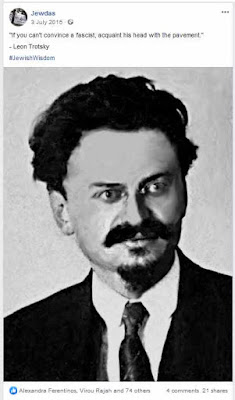
Leon Trotsky’s advice to anti-fascists was to acquaint the heads of the fash with the pavement
We remembered the advice of Leon Trotsky that ‘If you cannot convince a Fascist, acquaint his head with the pavement.” In other words we had to operate a No Platform for Racists and Fascists policy, to drive them from the streets. Not because we were opposed to freedom of speech because we recognised that allowing fascist groups to control the streets threatened the freedom of Black, Jewish and other minorities to walk down those streets.
It was also a time when the Establishment Jewish Board of Deputies launched an attack on the Anti-Nazi League, formed in 1977, because it was set up by anti-Zionists. The Board had never participated in any anti-fascist activity or been interested in combating racism or fascism.

The Board of Deputies posted this in the Jewish Chronicle to Jews to keep indoors and NOT oppose the fascists
In the 1930’s the BOD had opposed Jewish participation in anti-fascist activity and in particular the mobilisation to stop Moseley’s British Union of Fascists marching through the East End in the Battle of Cable Street in October 1936. Instead they posted a notice in the Jewish Chronicle telling Jews to stay at home.
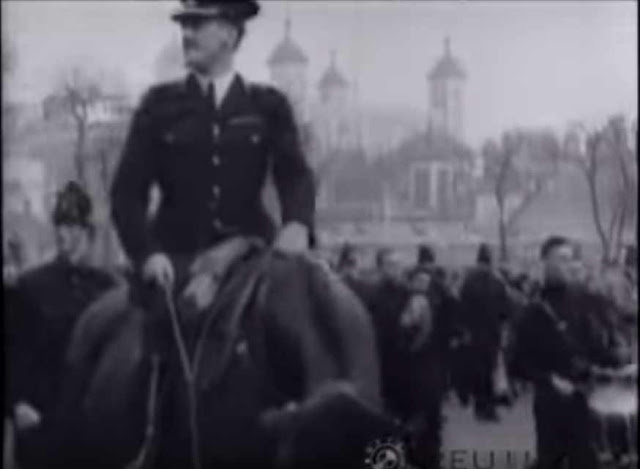
The Police were frustrated in their desire to force the fascists through the Jewish East End in October 1936
The ANL, which was a mass anti-fascist movement, together with Rock Against Racism helped destroy the NF with their mass rallies and concerts. The Editor of the anti-fascist magazine Searchlight, Maurice Ludmer, which was not unsympathetic to Zionism wrote:
“In the face of mounting attacks against the Jewish community both ideologically and physically, we have the amazing sight of the Jewish Board of Deputies launching an attack on the Anti Nazi League with all the fervour of Kamikaze pilots… It was as though they were watching a time capsule rerun of the 1930’s, in the form of a flickering old movie, with a grim determination to repeat every mistake of that era. ” (Issue 41, November 1978)

Anti-fascists built street barricades at the Battle of Cable Street in 1936 to stop Oswald Moseley’s fascists marching through the Jewish East End – the Board of Deputies opposed Jews taking part in a genuine fight against anti-Semitism
The key debate in NUS was over No Platform for Fascists & Racists. The National Organisation of Labour Students (NOLS), which was dominated by Stalinists including the SNP’s Tommy Shepherd MP, had just decided, after heated debates to support No Platform. What was Phillips reaction? He told NUS Conference that he was so disgusted that he would never join the Labour Party! Unfortunately this was one more promise he broke.
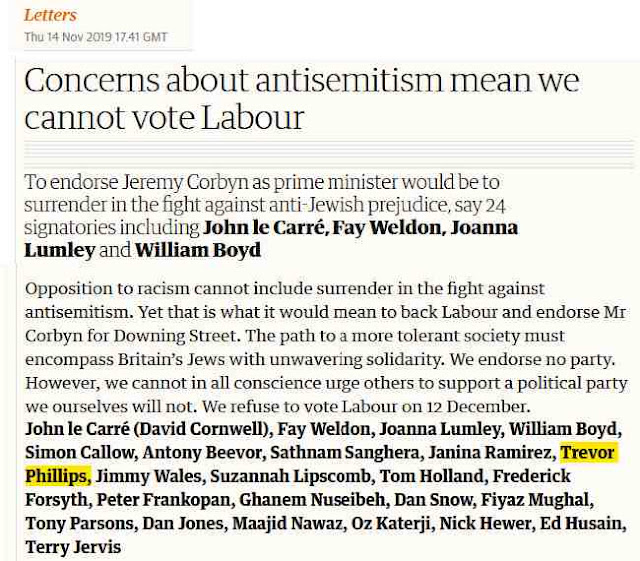
Uncle Tom Phillip signed this letter to the Guardian alongside Tories like Maajid Nawaz, Frederick Forsyth, Fay Weldon and other Islamaphobes
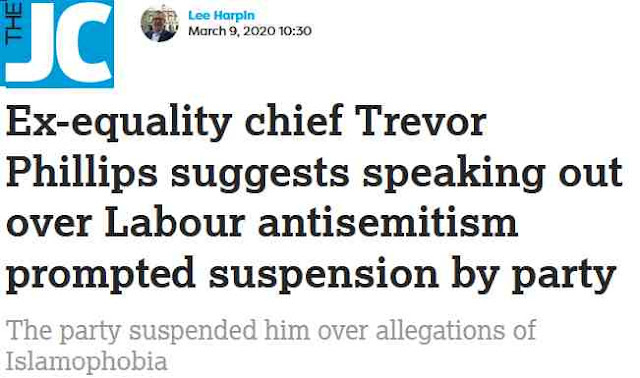
Phillip’s Suspension
According to the Jewish Chronicle
“the former head of the Equalities and Human Rights Commission has suggested his shock suspension from Labour Islamophobia allegations are linked to him speaking out about “leadership’s failure to tackle antisemitism in the party.”
In other words poor Uncle Tom Phillips has been penalised, not for anti-Muslim bigotry but his commitment to fighting ‘anti-Semitism’, which as we know is about Zionism and the Palestinians.
Just imagine, dear reader, that someone had said about Jews that ‘they see the world differently’ from non-Jews. I’ll take a bet with anyone that they would have been fast-tracked out of the Labour Party.
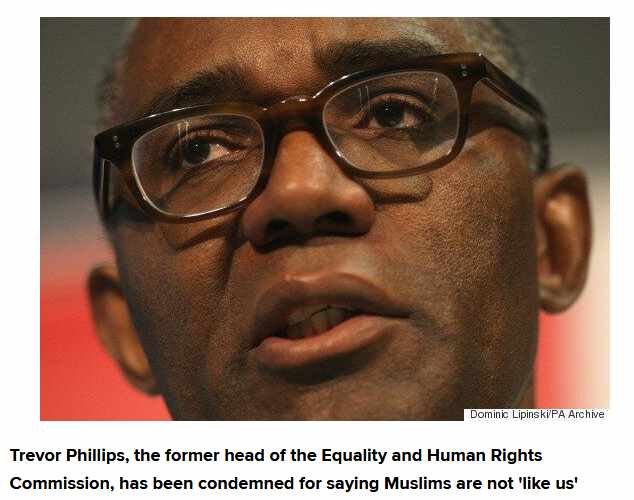
As Sayeeda Warsi noted amongst the things that Phillips has said are that “Muslims are not like us”; that Muslims “see the world differently from the rest of us”; and that British Muslims are “becoming a nation within a nation”. It is little wonder that he has received the stamp of approval from Tommy Robinson no less.
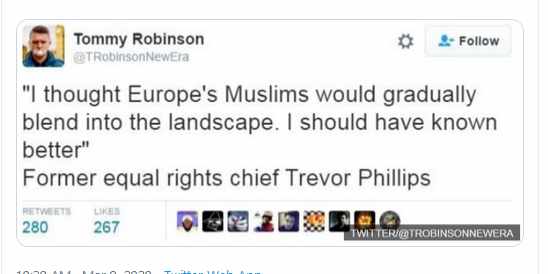
One of Phillip’s supporters is Tommy Robinson – says everything there needs to be said
According to Richard Littlejohn, who has the accolade of the most racist journalist in Britain today (I don’t consider Katie Hopkins a journalist), Trevor Phillips only agreed to Chair the EHRC in order to close it down! Given he neutered its legal and campaigning work there is much truth in this.
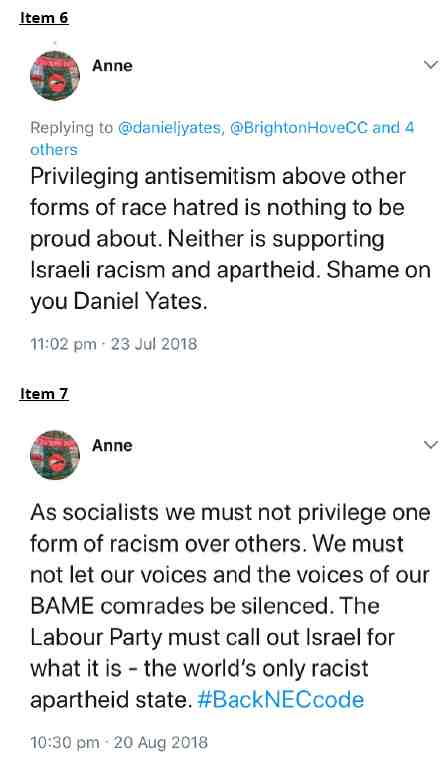

For these tweets, about Israel or the privileging of ‘anti-Semitism’ a Labour Party member was expelled under the fast track procedures, i.e. without a hearing,
Not surprisingly those who campaign so vociferously against anti-Zionism by labelling it ‘anti-Semitism’, have leapt to Phillip’s rescue.

John Ware revealed that Uncle Tom Phillips wanted to destroy the EHRC – which he nearly did!
John Ware, another Islamaphobic bigot who sees much merit and rationality in Islamaphobia, presented the propaganda Panorama programme ‘Is Labour Anti-Semitic?’ leapt to his defence in an article Cancelling Trevor Phillips. Is Labour Anti-Semitic? was the most dishonest programme I have ever seen. It deliberately refrained from interviewing anti-Zionist Jews and hid the identity and affiliations of all those Jews who did complain of ‘anti-Semitism’ (they were all officers of the Zionist JLM).
The anti-Roma bigot and ‘anti-Semitism Czar’ Lord John Mann described Phillip’s suspension as ‘Orwellian’. The reaction of the media and those who were involved in allegations of Labour ‘anti-Semitism’ to Phillip’s suspension demonstrates conclusivelythat the ‘anti-Semitism’ smear campaign was not about anti-Semitism or racism.
Below is an excellent and well researched article from Koser Saeed of Spotlight Magazine. I have lightly edited it and my additions are in bold but the original is here. It is well worth subscribing to at £5 a month to keep these valuable alternative news channels available.
Tony Greenstein
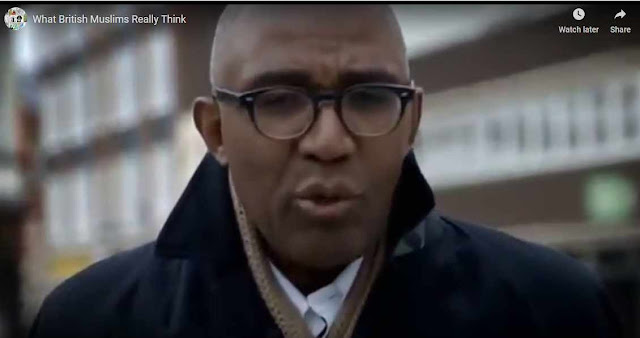
Earlier this week, the Mirror reported that the Labour Party took the decision to suspend Trevor Phillips (former head of the Commission for Racial Equality and chair of the Human Rights Commission [EHRC] over allegations of Islamophobia.
Phillips has been suspended over remarks about Pakistani Muslim men sexually abusing children in northern British towns and for saying that Muslims “see the world differently from the rest of us”.
He’s also been reported for boasting about being nominated as “Islamophobe of the year” by a UN body, while chairing a controversial event at the Tory party conference last year entitled “Challenging Islamophobia” The event disintegrated into a farce when attendees shifted the entire debate toward how to deal with extremists and why they should avoid defining Islamophobia, just in case it ‘restricts free speech’ and so it can’t be ‘weaponised’ against them. The Mirror printed the full transcript of the event.
At times, attendees and even Trevor Phillips were blaming Muslims for the attacks on Mosques in Christchurch, New Zealand (which resulted in the killing of 51 Muslim worshippers) and Finsbury Park (resulting in the death of one man with 10 others seriously injured). Rather than condemning the attacks, they were arguing that these attacks were a natural response to ‘the Muslim threat.’
Phillips was challenged by BBC Radio 4’s Today programme and accused of hypocrisy when he appeared to be happy to make generalisations about Muslims while, at the same time, condemning Labour’s supposed failure to properly tackle anti-Semitism, accusing Jeremy Corbyn of “embracing anti-Semites as comrades” and declaring that he could no longer vote Labour. Phillips defiantly held to his opinions and argued that Muslims are part of a group with “a particular set of values”
The Guardian reported that former Tory Party chair, Sayeeda Warsi said, of Phillips, that his
“understanding of race, racism and the barriers to integration has sadly been flawed for many years… Phillips cannot treat Muslims as a homogenised group when it suits him, then later deny they are racialized”
Naz Shah MP, the Shadow Minister for Women and Equalities and Vice Chair of the all-party parliamentary group on British Muslims, pointed out that “Some of the things he has said on public record would not be acceptable to any minority community,”How does a man who claims to be a champion for marginalised communities and who has held prominent positions such as Head of the Commission for Racial Equality and Chair of the EHRC align himself with overtly Islamophobic and racist views against Muslims and even find it humorous to ridicule Muslims?
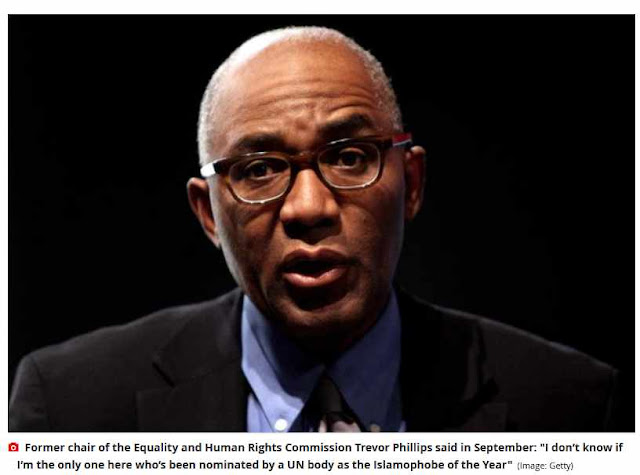
Phillips was very proud of his nomination as Islamaphobe of the year by the Islamic Human Rights Commission
What does it say about the EHRC that it was headed by a racist and Islamaphobe?
Phillip’s CV : Phillips was also chairman of the Runnymede Trust (a race equality think tank) from 1993 to 1998 and currently Phillips is the Deputy Chairman of the board of the National Equality Standard (NES). NES sets clear Equality, Diversity and Inclusion (EDI) criteria by which companies are assessed.
Phillips is a close personal friend of Peter Mandelson and was best man at his first wedding. He signed up to the ‘New Labour’ agenda and became friendly with Tony Blair. Blair honoured Phillips with an OBE.
In May 2000, after Ken Livingstone won the Mayoral contest the Labour Party put Phillips forward as a ‘top-up’ candidate for the London Assembly. Phillips served as Chairman of the Assembly until February 2003. The primary role of the London Assembly is to scrutinise the activities of the Mayor of London. Suffice to say there were a number of clashes between Livingstone and Phillips during this time. One of the key reasons for their disagreements was down to Phillips’ rejection of multiculturalism. Phillips opposition to multiculturalism colour much of his attitude and opinions.
In April 2004, Phillips called for the government to reject multiculturalism. He claimed it legitimised “separateness” and proposed that the government should “assert a core of Britishness” instead.
In Sept 2006, Livingstone accused Phillips of “pandering to the right” and said that he had “an absolutely disgraceful record” at the Commission for Racial Equality. He accused Phillips of turning the CRE into “a vast press department” and claimed that under Phillips stewardship, the CRE “wound down all the legal work.”
Six EHRC commissioners resigned citing concerns over Phillips’ leadership and probity during his tenure as Chair of the EHRC, leading to a breakdown of trust and confidence in the chair.
In July 2009, two former commissioners accused Phillips of “divisive leadership” Kay Hampton said his leadership style was “better suitedto a political organisation rather than a human rights one”. Sir Bert Massie asked “How do you manage to alienate that number of people?…it’s quite a skill. These are not people who are rebels for the sake of it.” Massie, a leading disability rights campaigner who had sat on government bodies and committees for 30 years, went on to explain how he and his fellow commissioners often learned of policy announcements through press releases.
Days later, Ben Summerskill (of the gay rights group Stonewall), also resigned as commissioner. Summerskill said that Phillips’ style of leadership had “unnerved” many commissioners. Summerskill seemed to imply that Phillips’ personal ambition or agenda was taking precedence over the important work that the commission should be doing in trying to help victims of prejudice.
Following a spate of resignations, the Joint Committee on Human Rights (JCHR) decided to investigate the EHRC. Fearing the JCHR report would paint him in a bad light, Phillips contacted three of the Peers involved in the investigation, allegedly in the hope of discussing the draft report. The JCHR then raised concerns that Phillips was attempting to influence the views of some of the committee members, prior to the publication of the report. However, the Lords Privileges Committee who subsequently investigated Phillips conduct concluded that Phillips was not in contempt of Parliament and that it was merely inappropriate and ill-advised of him to have contacted three members of the JCHR committee and ask for some of the evidence to be redacted and to express his unhappiness over the fact that the JCHR report was critical of his conduct.
In March 2015, Channel 4 aired an opinion piece produced by Phillips called ‘Things we wont say about race that are true’ It was packaged as a documentary peppered with a few broad statistics, some anecdotal data and selected remarks made by a few prominent individuals. In this piece, Phillips tried to argue that racial profiling is justified but instead of inviting a broad debate or investigating causality, Phillips produced a self-indulgent monologue expressing ‘his’ opinion. For example, in Phillips world, there are disproportionally more black people in prison because they have a higher propensity for a type of criminal behaviour. No consideration is given to racial profiling by the police or the fact that black kids frequently get tougher sentencing than their white counterparts.
Phillips argues that because black kids are more likely to be killed and typically their killers are more likely to be black then this too has to be black criminal behaviour. He completely side steps the socio-economic factors that push kids from deprived neighbourhoods (who tend to be predominantly black kids) into criminal behaviour. Phillips openly argues that isolated or segregated Muslim communities were a hot bed for “an ugly perversion of Islam” that bred terrorism and that most communities, left to themselves, actually prefer segregation.
Phillips gives absolutely zero consideration to the lack of equal opportunity, lower paid jobs, racism and racial abuse and physical attacks if you move to a white area or the fact that white people are more likely to be able to afford to move out to more affluent, usually white, areas.
Phillips also tries to make the case that segregation stokes terrorist behaviour – not deprivation, not persecution, not racial abuse, not foreign policy etc. By making this argument, Phillips implies that segregated communities express deviant behaviour but then he shies away from including segregated white communities in this assessment.
Phillips further bolsters his argument of deviant behaviour in segregated Muslim communities by talking about Asian grooming gangs as if grooming or deviant sexual behaviour was somehow predominantly perpetrated by Pakistani Muslim men. He fires off a few statistics: Between 1997 and 2010, there were 17 court cases linked to street grooming gangs with over 200 victims. 56 men were convicted but only 3 were white and 40 were Pakistani heritage Muslims. Phillips concludes from this that there has to be a cultural factor to this behaviour (another disguised attack on multiculturalism).
Phillips conveniently side steps facts like how the vast majority of sexual grooming of young children is done online by white men. A Home Office Report on Cyber Crime, published in October 2013 revealed that between 2004 and 2013, the number of sexual grooming offences recorded by police in England and Wales was 2,778.

It also quoted several studies on the characteristics of offenders. In one study of 633 UK males convicted of IIOC offences (Indecent Images of Children) it found that their average age was around 39 years, over 80% were either single or divorced and 93 per cent were convicted of making as well as consuming images. Another study covering 97 cases of offenders who committed IIOC and contact sex offences against 246 children between them found that most offenders were white unemployed males, aged between 19 and 45 years and that those who were employed predominantly worked in schools or care work and over a half lived with children.
Another study hoping to compare traits of online against offline offenders also concluded that online offenders were “broadly younger than offline offenders; more likely to be White, and have greater victim empathy and sexual deviancy than offline offenders.” …
So, can Phillips identify the cultural factor that explains why the vast majority of online IIOC offenders and groomers are white and how does this fact support his argument for eradicating multiculturalism?
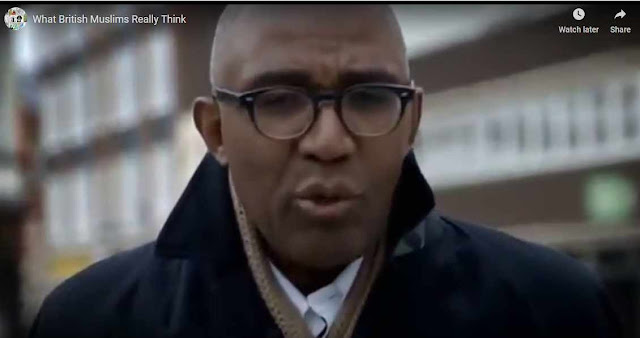
In April 2016, Phillips produced another documentary for Channel 4 called “What British Muslims really think”. The program opens with Phillips painting a picture of large swathes of Muslim men as terrorist who leave the UK to go and fight abroad and who, he says, “may return to take up arms here”. He then goes on to make an explicitly racist statement.. “I think there’s little doubt that it’s the extremist adherence of one particular faith – Islam – who have created a major fault line in this country”.
Once again, using a subjective monologue, rather than a formal investigation or a broad debate, Phillips attempts to paint a picture of a community of people as ‘other’, ‘abnormal’ even ‘savage’ – a community Phillips knows next to nothing about. Phillips argues that extremist views within Muslim communities are the norm and not the exception. The program is largely Phillip’s interpretation of an ICM Survey on Muslims, commissioned for Channel 4. ICM undertook face to face interviews with 1,081 Muslims, over the age of 18, between 25 April and 31 May 2015 and compared it to ‘a nationally-representative control group’ of 1,008 adults, over the age of 18+ who they interviewed by telephone between the 5 and 7 June 2015. The full report is no longer available on the ICM website so it’s impossible to check what questions were asked or how they were phrased but there are references to it in the ‘review of survey research on Muslims in Britain’, which was carried out by Ipsos MORI in February 2018.
Despite the sample size being just 1,081 people, Phillips starts his argument by claiming that the methodology employed by ICM was meant to produce data representative of half of all British Muslims. The reconstruction video used for dramatization purposes shows a young Muslim woman interviewing an angry looking Muslim man.
One of the questions posed in the survey was to ask if it was acceptable to use suicide bombing as a way to fight injustice. According to the results of the ICM survey, 4% of the Muslim group agreed it was acceptable, compared to 1% of the control group who supposedly represented the wider population. The ICM spokesperson then extrapolates that to the British Muslim community at large and claims that this represents just over 100,000 British Muslims. He neglects to mention that 1% of the wider population extrapolates to approximately 678,860 non-Muslims.
It’s also unclear if there was any context to the question that might have directed a certain response. For example suicide bombing in London is a clear act of terrorism whereas a suicide bombing in Israel is clearly part of an ongoing struggle against the colonisers.In Israel it has to be placed in the context of the repeated bombing and attacks on civilians and Palestinian homes.
Cross referencing the Ipsos review we discover that the question posed was “To what extent do you sympathise with or condemn people who commit terrorist actions as a form of political protest”
Which begs the question, ‘What is terrorism?’. Who defines ‘terrorism’. Was for example the IRA terrorist? Catholics never accepted Partition or the Ulster statelet would say ‘no’ in large numbers. During ‘the Troubles’ Sinn Fein, the IRA’s political wing, elected MPs and captured seats like West Belfast.
The response showed only 1% of Muslims completely sympathised. Another 1% said they partially sympathised and 3% said they didn’t sympathise but didn’t condemn either.
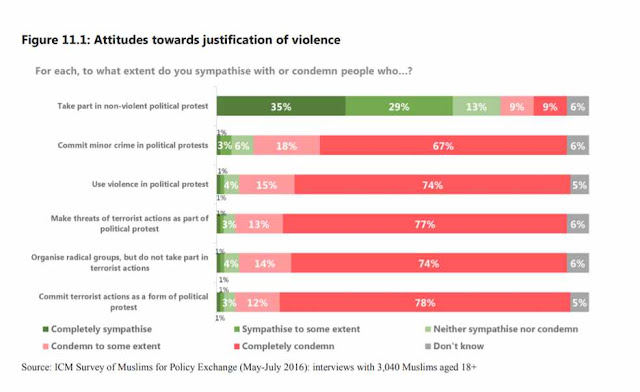
So, in truth, only 2% of Muslims showed any sympathy at all with terrorism, however defined. This was not all that much different to the wider population. The Ipsos review also pointed out that another survey on non-Muslims, undertaken by YouGov, showed that a higher percentage of ordinary British people believed terrorism would be justified under occupation (54%), or if you were fighting an oppressive regime (52%), or if you were fighting for independence (42%). Which is the position of the Palestinians. However, Phillips chooses to take the data exclusively from the ICM survey and then deliberately frames it in a way to imply that Muslims have a higher propensity for terrorist behaviour.
Phillips then goes on to express an unqualified personal opinion suggesting that there aren’t enough “liberal and reforming British Muslim voices” to counter, what ‘he’ perceives to be, the Muslim propensity for terrorist behaviour. Phillips effectively manufactures a problem with Islam, provokes fear of Muslims, implies Muslims are incapable (or perhaps unwilling) to deal with ‘the problem’ and sets up the argument for government or police intervention. It is a straw man argument.
The program also repeatedly dips back into the ongoing theme – the perils of multiculturalism – arguing that British Muslims do not wish to integrate. He acknowledges that they are happy to socialise with and work alongside non-Muslims but they rarely make the effort to visit a non-Muslim house, although the program does acknowledge that community segregation plays a big part in this as white and non-Muslims communities are equally unlikely to make the effort to integrate.
Anyone with any sense of history will know that all communities under attack from racists self-segregate for their own protection. That is exactly what happened with Jewish immigrants to Britain. They congregated in the East End and racists like Phillips then complained that they weren’t integrating!
Phillips goes on to express another unqualified personal opinion. He shockingly claims that there’s a “clear cultural gap between a significant section of Britain’s Muslims and the wider population”. As Phillips himself frequently likes to point out, Islam is a religion, not a race or ethnicity and therefore not a cultural identity. Muslims are as diverse in their cultural heritage as Christians. You wouldn’t assume that the majority of white British Christians with historical roots in the UK would have much in common culturally with Christians in India or South America, for example.
Phillips’ objective appears to be to set Muslims aside as ‘other’ to every other religious, racial and cultural group in the UK. If that wasn’t bad enough, he assigns traits. According to Phillips, Muslims do not value “equality of women, social tolerance, freedom of expression” and they do not “embrace same sex marriage”. He implies by this that other religions value women’s equality and freedom of expression and approve of social tolerance and same sex marriage – despite data showing quite the contrary.
It’s worth pointing out also that the ICM Survey did not compare Muslim attitudes with those of members of other religious groups – it compared Muslim attitudes with those of the wider mixed population which would have included people of many religious backgrounds and of none. We can therefore only speculate as to how Muslim attitudes might have compared with Catholic or Jewish Groups.
It would be interesting to see if Phillips can find an Orthodox Jewish Synagogue prepared to marry two gay men. I suspect he will be looking for a long time! The Church of England refuses to ordain gay men, still less marry them. Nor has the Catholic Church changed its position on gays or abortion. Organised religion has always been backward socially. Islam is no exception.
At one point, Phillips touches on British Muslims attitude towards Jews. No data was provided on Jewish attitudes towards Muslims or societies attitude towards Muslims in general or any of the reasons why some Muslims might harbour negative attitudes towards Jews, Zionism and Israel.
I have no doubt that if a survey of Jewish attitudes were undertaken, then the results would show a high degree of both anti-Muslim and anti-Arab bias.
The Institute for Jewish Policy Research (JPR) recently undertook a wider study on Antisemitism in Great Britain, which also revealed that British people held more negative views about Muslims than they did about any other religious group.
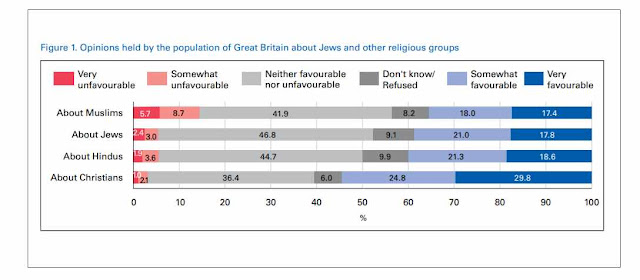

One suspects that Phillips wouldn’t be in the least bit interested in doing a documentary about rampant Islamophobia in wider British society. JPR also revealed that 28% of the British population agreed with at least 1 Antisemitic statement. [health warning – not all of the statements are anti-Semitic]
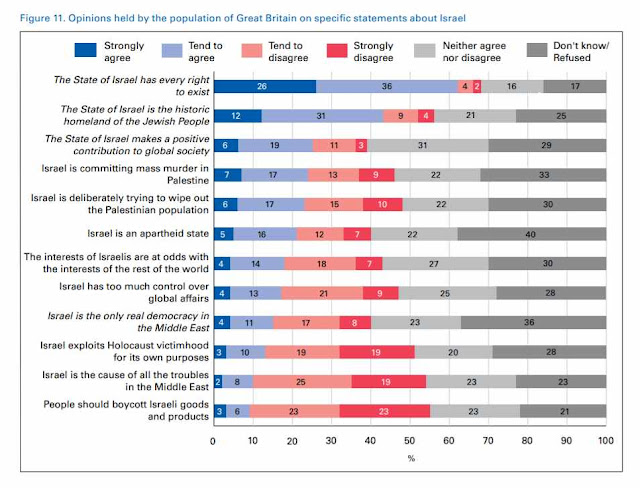
It also found that 24% believed that Israel is committing mass murder in Palestine and 21% believe Israel is an apartheid state.
At some point, the program made a conscious decision to deviate away from investigating “What British Muslims really think” and decides instead to investigate Islam’s treatment of women. It focus’s particular attention on an Islamic tenet that a wife should obey her husband and that polygamy is tolerated under certain circumstances. Phillip attempted to argue that subservience to husbands is a purely Muslim attitude and yet in Christianity there are clear instructions on how women should be subservient to their husbands….
Ephesians 5: “Wives, submit to your husbands as to the Lord. 23 For the husband is the head of the wife as Christ is the head of the church, his body, of which he is the Savior. 24 Now as the church submits to Christ, so also wives should submit to their husbands in everything.”
Colossians 3: “Wives, submit to your husbands, as is fitting in the Lord.”
I Peter 3: “Wives, in the same way be submissive to your husbands so that, if any of them do not believe the word, they may be won over without words by the behavior of their wives… … They were submissive to their own husbands, 6 like Sarah, who obeyed Abraham and called him her master.”
It has clearly escaped Phillips’ mind that traditional Christian marriage vows for women include the words “Love, honour and obey” and Phillips also missed the bit in Colossians 3 that instructs slaves to obey their masters “with sincerity of heart and reverence for the Lord”.
Most religions share many of the same backward values and do not sit well with contemporary attitudes. It is worth noting too that Polygamy is not forbidden in the Old Testament and Judaism. The Lutheran Church and the Anglican Communion also tolerate it under certain circumstances. So too does Mormonism which only very reluctantly was forced to abandon it in the United States. In Hinduism, the Rig Veda states that a man could have more than one wife and the Dharmashastras allow men to marry women of lower castes provided that the first wife was of equal caste. Common people (i.e. lower castes) were only allowed a second marriage if the first wife could not bear a son. In Judaism, the Torah states
“If he take another wife for himself; her food, her clothing, and her duty of marriage, shall he not diminish” and that“a man must award the inheritance due to a first-born son to the son who was actually born first, even if he hates that son’s mother and likes another wife more”.
Clearly, many popular religions tolerated Polygamy so why make the case that this is somehow exclusively Islamic?
Phillips introduces a statement by Elham Manea, an Associate Professor of Political Science at Zurich University, who has been researching the treatment of Muslim wives in Britain. Manea identifies the attitudes of some Muslim men towards their wives…·
* Threatening their wives that they would leave them and get another woman if they don’t do what’s expected of them.
* Threatening to get another women if he can’t have children with the first wife
* Expecting the wife to fulfil his sexual needs even if she doesn’t want to – refusing to recognise rape within marriage.
Of course if we were to undertake a study of non-Muslim men in British society or, better still, ask non-Muslim British women, one wonders how many of them might reveal that their husbands have threatened to beat them up or leave them if they don’t do what’s expected of them and how many of their husbands demand sex as a marital right? Anyone who has worked in domestic violence services would be able to give you a pretty good picture. To imply that these are exclusively Muslim traits is simply outrageous.
Phillips tries to argue that many British Muslims generally don’t want to change and refuse to adopt some of the behaviours of wider society. Phillips again redirects the debate towards multiculturalism being a bad thing and that integration can only be achieved through migrants losing their cultural and/or religious identity and being assimilated. He then attempts to present the opinions of a small number of Muslims who do hold extremist views about introducing Sharia Law into the UK as if it were mainstream opinion amongst British Muslims. In fact, Islam actually instructs Muslims to obey the law of the authority they live under (which is exactly the same as Jewish law!).
In other words, any adherence to Sharia instruction cannot conflict with the law of the land. Sharia courts are notoriously unfavourable towards the rights of women (as any court founded in religious doctrine might be) but that does not mean that they are allowed to enforce a ruling and they certainly do not have the power or the right to challenge British law.
Phillips then makes another wild claim. He asserts that the ICM survey for Channel 4 revealed that Muslim communities who “hankered over a separate life” (i.e. those who live in segregated communities) were more sympathetic towards violence and extremism. He alleges that when asked what action they would take if they knew someone who was supporting terrorism in Syria, only 34% said they would report it to the police. Phillips then claims that this could be because the majority of Muslims might be sympathetic to the cause of would-be jihadists. The ICM representative does however explain that the question posed was framed in a way to ask if they had any “sympathy” for them, rather than specifically asking if they were ‘supportive’ of the actions.
Phillips rephrases the question and manipulates the data in order to conjur up a frightening image of British Muslims. By contrast, the Ipsos MORI review of survey research on British Muslims reveals that 71% of Muslims said they have no sympathy with young Muslims who leave the UK to join fighters in Syria and they also point out that “sympathy” is an ambiguous term so it’s not clear how the respondents might have interpreted the question. It’s possible that they were expressing sympathy for “young Muslims” in general, rather than sympathy for their motives.
The Ipsos review also found that 94% of Muslims say they “would report it to the police if they knew someone in the local community was planning an act of violence”
Shockingly, even though Phillips is forced to admit that the ICM report shows only a small minority of Muslims actually ‘sympathise’ with violent acts abroad, he still insists on trying to find links between minority extremist sympathies and wider community behaviour. The ICM researcher then responds to this question by attempting to argue that respondents who expressed feelings of “lack of social capital” or a desire not to integrate or an aspiration to follow (what he terms as) a more “fundamentalist Islamic lifestyle” or to follow “Sharia Law” are somehow proving there is a correlation between mainstream attitudes and more extreme views.
Not only does Phillips make a complete leap interpreting the information, he wrongly implies that the desire not to integrate, and the aspiration to follow a so-called “fundamentalist Islamic lifestyle” is mainstream thinking for British Muslims. Phillips then adds that those Muslims who have expressed some sympathy for violence are twice as likely not to want to integrate into wider society.
Phillips concludes that, in his opinion, Britain’s ‘Live and let live culture’ provides fertile ground for extremist thinking to flourish and creating “a nation within a nation”, proving once again, that Phillips is happy to draw wholly unfounded conclusions and stoke up fear of ‘the other’ all in the name of eradicating multiculturalism.
Not content with pretending to be interested in “What British Muslims Really think”, he then poses a new question.. “What are we going to do about it?” In other words, What New Racist Measures Should We Introduce?
There’s a nasty whiff of Nazi ideology permeating through this argument. Where there once was a ‘Jewish problem’ that needed ‘a solution’ now there’s a ‘Muslim problem’ and Phillips asks the viewer ‘what should be done about it’? He calls on Britain’s to turn away from tolerance and reject our ‘Live and let Live’ ideals and he claims that this is somehow a ‘liberal’ viewpoint?
Phillips then makes the case for creating a set of policies that promote integration and produce a number of clear red lines that his version of Utopia will not compromise on and that all Muslims must abide by and he demands that we support liberal trends in all parts of society (although it’s hard to imagine what Phillips means by Liberal trends when he’s already written off the fundamental liberal trend of Live and Let Live).
Phillips proposes legislating to force schools to have targets for admitting children of different ethnic backgrounds in order to encourage greater integration. Of course schools tend to serve catchment areas and if a catchment area is predominantly white and Christian then meeting quotas of ethnic or other religious groupings is going to be almost impossible – unless you adjust the quota according to the local catchment area (which rather defeats the object).
Phillips cites an example of a new school that was built specifically for the purpose of integrating two catchment areas – one predominantly white the other predominantly Asian which, the program notes had some success at encouraging integration between the groups. However, it’s wrong to assume that simply mixing in schools or at work or even when socialising is actually going to break ground and solve the problem of integration between communities.
Phillips also proposes looking at the ethnic mix in social housing and setting quotas to encourage mixing. It’s interesting why Phillips specifically mentions social housing because it demonstrates that he recognises that Muslim communities have largely been ghettoised and deprived. After all, you don’t have many Muslims families who are able to afford to live in wealthier neighbourhood. Perhaps, if Phillips is genuine about encouraging integration, he might have chosen to focus more of the program on how factors such as deprivation, inequality, lack of opportunity, racism and Islamophobia create segregation and alienate an entire community and how all these factors might contribute to the reason why some Muslims hold some of the opinions that they do?
In 2016 Civitas published “Race and Faith: the Deafening Silence” by Trevor Phillips in which he tries to argue that ethnic and cultural difference pose a danger to society and makes the case for “active integration” as opposed to “organic integration”. He starts by painting a vivid picture of an Islamist threat with “Islamist terrorism” apparently “firmly camped on European shores” and criticises European elites for not wanting to debate the “consequences” of “ethnocultural diversity”. Phillips seems to argue that the only way to mitigate the ‘dangers’ of ethnic diversity is to attack multiculturalism and force migrants to turn away from their cultural roots and instead be forcibly ‘integrated’ (i.e. assimilated) into ‘British culture’.
Phillips deliberately chooses not to recognise that Islam and Judaism are religions and not cultural identities or, more importantly, that British culture is a mixture of cultures – the food we eat, the music we listen to, the clothes we wear, the words we use… (colonialism has a lot to answer for).
In this book, Phillips argues that multiculturalism is responsible for all the strife between communities and for sexist aggression – implying that ethnic minorities introduced sexism and aggression towards women into British society. Phillips imagines a world where white British women had equal opportunities and had never been beaten or deprived of opportunities or raped, a world before migrants landed on British shores. He further claims that if we choose not to address the pink elephant flying around his padded cell, then we’re suppressing ‘his’ freedom of expression (and those like him) and we’re risking reversing hard-won civil liberties.
Over the years, Phillips has repeatedly argued for his own freedom of expression and has called for society to conform to what he considers to be ‘liberal values’, while at the same time denying anyone else’s freedom of expression and discarding, bastardising and ridiculing the values of other community groups. Smells of fascism to me?
The Trevor Phillips suspension is exposing the British media for the shyster it is
The Labour Party has suspended Trevor Phillips over allegations of Islamophobia. The response from British media outlets and figures is a sight to behold. Because it’s a far cry from their coverage of alleged antisemitism in the party.
Islamophobia
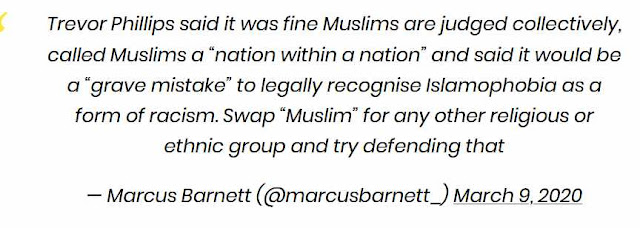
The Times first reported on Phillips’s suspension, describing him as a “pioneering anti-racism campaigner”. The ex-head of the UK’s equality watchdog has a checkered past when it comes to comments on Muslims, to say the least. One Telegraph headline in 2016, for example, read:
British Muslims becoming a nation within a nation, Trevor Phillips warn
That same year, the Daily Mail reported that Phillips said Muslims are ‘not like us’. Who exactly Phillips was referring to in his amorphous ‘us’ is unclear.
Meanwhile, the Times reported:
Comments by Mr Phillips about the failure by some Muslims to wear poppies for Remembrance Sunday and the sympathy shown by a substantial proportion in an opinion poll towards the “motives” of the Charlie Hebdo killers also form part of the complaint.
Phillips has been energetically talking up the differences between ethnic groups for a long while now, though. That’s made him somewhat of a favouriteamong Britain’s right-wing press. Because highlighting the differences between people along ethnic lines – rather than what unites them – is a pet topic for these rags, of course.
Same thing
On the other hand, these same right-wing rags – along with the rest of the mainstream media – have spent the last four years rallying against these sorts of views in relation to another religious group: Jewish people.
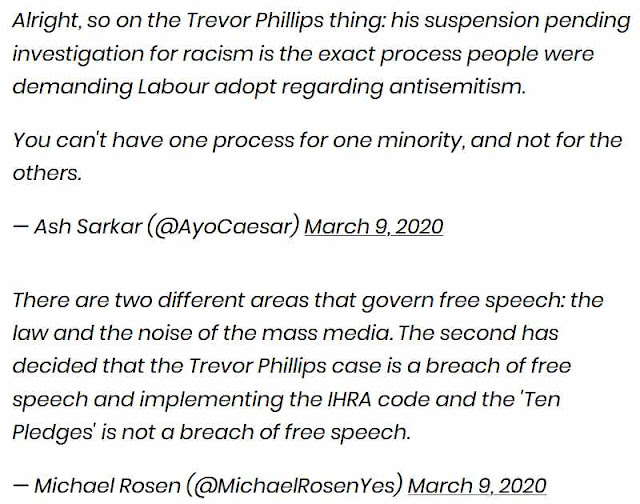
So why are they giving Phillips ample airspace to defend his views, while criticising his suspension?
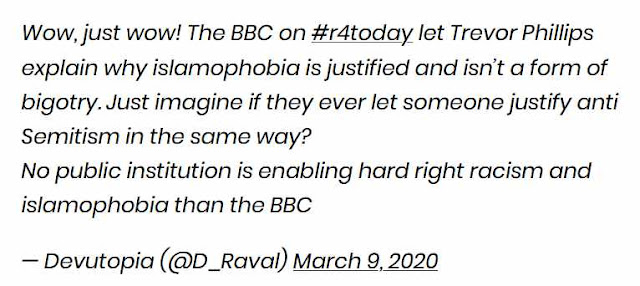
There are a number of reasons. Firstly, as already mentioned, racism isn’t hard to find in the British press. Islamophobia in particular is a regular feature in content. Indeed, it’s very prevalent in politics too, particularly in the Conservative Party. So it’s unsurprising that figures in Britain’s largely Tory-supporting press are keen to brand Phillips’s views as unproblematic. Conceding they are would be like holding up a mirror to their own faces.
Furthermore, Phillips has publicly criticised Jeremy Corbyn over alleged antisemitism in the party. He was a signatory to a letter that accused the Labour leader of being “steeped in association” with the prejudice. So condemning Phillips won’t reflect badly on Corbyn; it can’t be used as a stick to beat the Labour leader with. Although one Daily Mail columnist did try to turn the suspension into an argument against Corbyn’s leadership:
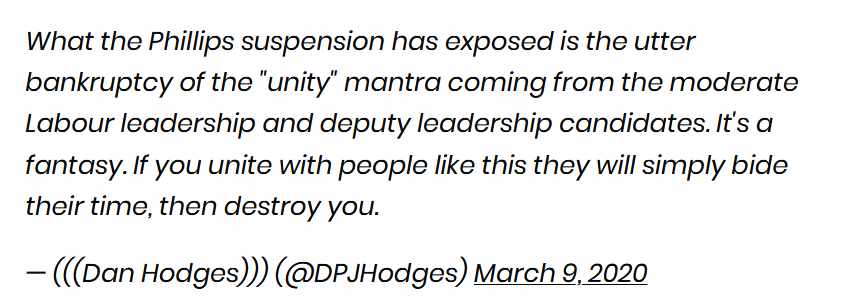
Shysters
In short, Phillips’s suspension has exposed Britain’s media for the shyster it is. Not all prejudices are equal in its world. And the ones which get short-shrift are the ones the media can’t use to attack political foes.